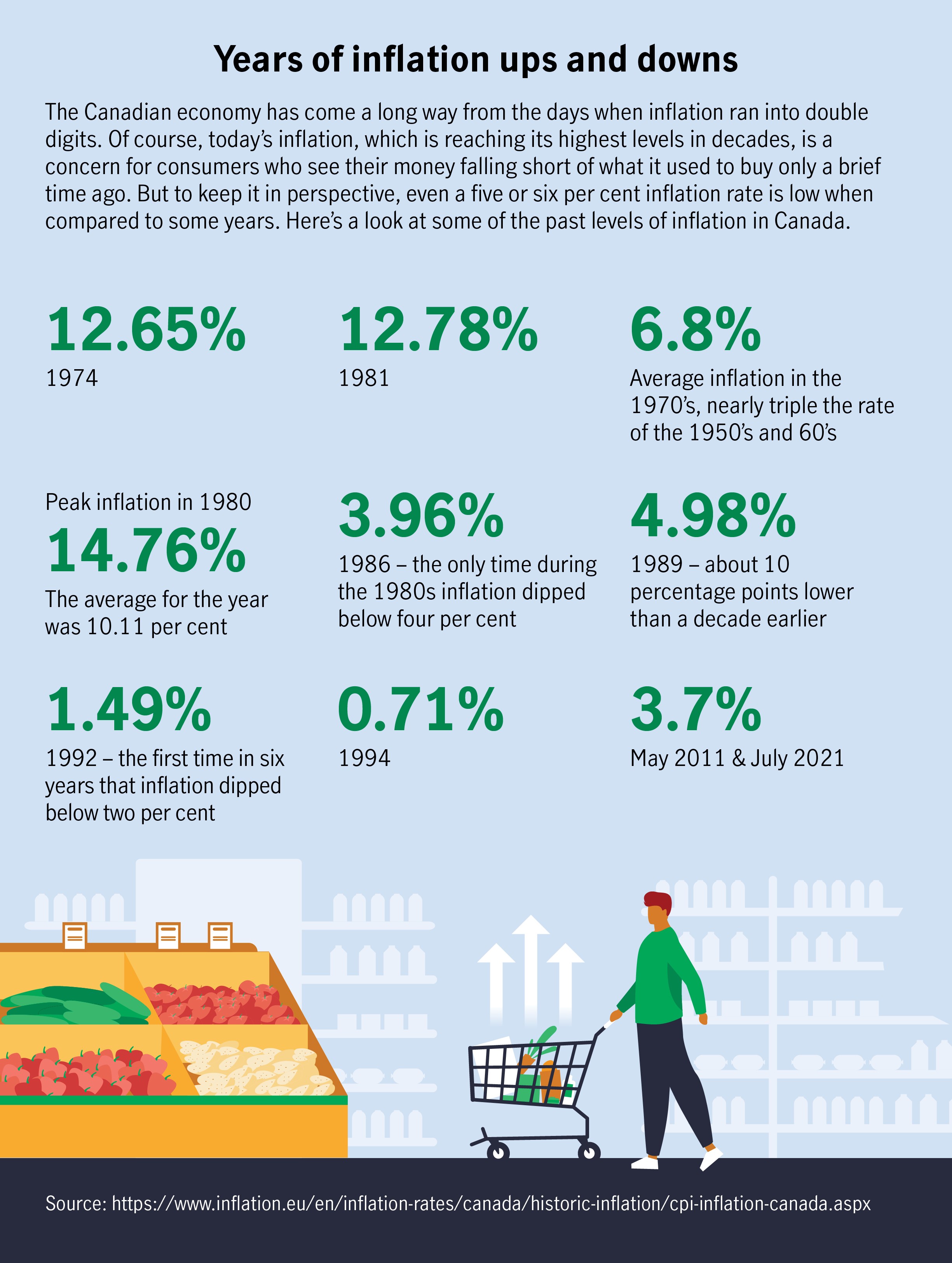Higher prices can chip away at your savings, so position your money to stay a step ahead.
If it feels like your dollar doesn’t go quite as far as it used to, you aren’t imagining it. The reason is inflation, which describes the gradual rise in prices and slow decline in purchasing power of your money over time. Here’s how to understand inflation, plus a look at steps you can take to protect the value of your money.
When widescale reaction to the global pandemic began in March 2020, the Canadian economy entered uncharted waters. Global stock markets experienced their biggest drop in years, unemployment and business closures began to rise and supply chain interruptions soon contributed to a downward trend for the inflation rate, which eventually reached 0.72%. However, it didn’t stay that low for long.
The Bank of Canada boosted the economy by injecting massive amounts of money into the financial system through the purchase of bonds and other assets (known as quantitative easing) and lowering long-term interest rates. In late 2020, vaccine development gained ground and a return to higher consumer spending appeared on the horizon, stoking confidence in an economic recovery.
What is inflation?
Inflation is the financial term that describes a rise in the Consumer Price Index (CPI), a measurement that reflects average changes in the cost of the typical goods and services purchased by households. The CPI is published monthly by the Bank of Canada.
When the economy gains strength, prices often go up. Today, as the pandemic recedes and the economy re-energizes, inflation is being pushed higher by a combination of factors. These include a return to brisk consumer spending, a recovering labour market and the loosening of many COVID-19 restrictions. However, they are driving up the price of everything from furniture to cars to coffee.
Effects of inflation
Popping into a grocery store, gas station or coffee shop today means paying higher prices thana year ago. And those aren’t the only places where you will face rising costs. You may also see them at the bank. This is due to the relationship between interest rates and inflation. When the Bank of Canada wants to reduce the rate of inflation, it raises interest rates, which raises the cost of borrowing money in the form of mortgages, loans, and lines of credit.

Is Inflation good or bad for consumers?
Inflation itself is not necessarily good or bad as it depends on how fast and how much it rises. Rising inflation can be an indicator of a growing economy as it often translates to job growth and rising wages. As a result, some consumers may have more disposable income to spend on more goods and services. A moderate level of inflation is generally good for the economy, which is why the Bank of Canada’s target inflation rate is 2%.
On the other hand, if the rate of inflation rises too quickly over a short time frame, consumers’ money quickly becomes worth less as the prices of goods rise more quickly than consumers can adjust to. Rapidly rising or volatile inflation can also be bad for corporate profits, as companies try to absorb rising costs and/or slowing sales. The Bank of Canada will often raise interest rates in these scenarios to cool an overheating economy and keep inflation within its target range.
Handling inflation
So what can you, an average consumer, do in the meantime to reduce its effect on your day to day life?
We’ve got some tips below to help:
- Put off large-scale expenses (if you can)
- Save on groceries
- Get a rewards or cash back credit card
- Pay off your debt
- Invest wisely
Ask any boomer who survived the roaring inflation of the early 1980s and their advice for younger generations would be: Take the bus, pack a lunch, and skip the overseas vacation. Pattie Lovett-Reid, a chief financial commentator for Home Equity Bank said, “If your discretionary income is being redirected right now to pay for basic expenses, some financial habits might have to change.”
Cutting back on subscriptions to various streaming services, forgoing the latest smartphone, making lunches rather than going to the food court and using the office coffee machine instead of paying for a pricey latte can all help save cash at the end of a month.
Managing inflation risk through investment diversification
The best way to mitigate the risk of rising inflation is to have a well diversified portfolio. If you’re investing for the long term, your portfolio should have a mix of different assets that suit your goals. If you put too many of your investment eggs in the bond and fixed income basket, you run a higher risk of a decline in your purchasing power over time if inflation rises.
A strong portfolio is one that is diversified across different dimensions. That may include holding different types of securities that are diversified between different sectors, markets, currencies and even countries.
Having a well diversified portfolio with an asset allocation based on risk tolerance is the best defense against inflation. In most cases, inflation will be a short-term issue that should not impact or change your long-term investing goals.
We are here for you
Planning for uncertainty is an important part of our financial planning process. We build “what-if” scenarios into our plans for our clients so they feel confident that all contingencies have been considered. It helps our clients to consider adjustments, as required, and to feel better about how prepared they are for the future. Speak with an advisor, who can help you take advantage of new opportunities as they arise and ensure your finances can stand up to potential challenges. Feel free to reach out to us for a free 30 minute consultation.
[1]www.bankofcanada.ca/rates/indicators/capacity-and-inflation-pressures/inflation

